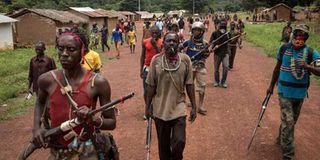UN aid chief warns of signs of genocide in Central African Republic

Anti-Balaka fighters walk in Gambo, southeast Central African Republic, on August 16, 2017. UN aid chief Stephen O'Brien told the Security Council Tuesday there are early signs of genocide in the violence-plagued country. AFP PHOTO | ALEXIS HUGUET
What you need to know:
- UN maintains some 12,500 troops and police on the ground to help protect civilians.
- The number of displaced in CAR — a country of 4.5 million people — has soared to 600,000.
- Central African Republic was pitched into a war between Muslim and Christian militias in 2013.
UNITED NATIONS
United Nations aid chief Stephen O'Brien told the Security Council Tuesday there are early signs of genocide in the violence-plagued Central African Republic, according to diplomats.
O'Brien made his remarks in a closed-door meeting — which was not on the official council agenda and was called for by France — following his recent visit to the country, one of the diplomats told AFP.
The aid chief's warning echoed what he said earlier this month, when he told a UN meeting "the early warning signs of genocide are there" and urged more troops and police to bolster the UN peacekeeping mission in the strife-torn country.
UN TROOPS
The United Nations maintains some 12,500 troops and police on the ground to help protect civilians and support the government of President Faustin-Archange Touadera, who was elected last year.
The number of displaced in CAR — a country of 4.5 million people — has soared to 600,000, O'Brien said according to the diplomat, who added the tally was 40 percent higher than last year.
The UN official also warned the council of violence targeting humanitarian actors on the ground, forcing them to drop many of their duties. Violence is spreading in the country, including in the region of Bangassou in the southeast, the same diplomatic source said.
WAR
One of the world's poorest nations, Central African Republic was pitched into a war between Muslim and Christian militias in 2013, unleashed when President Francois Bozize, a Christian, was overthrown by a coalition of Muslim-majority rebel groups called the Seleka.
They in turn were ousted by a military intervention led by France, which was followed by bloody reprisals by the mainly Christian anti-Balaka militia.
Groups on both sides are now fighting for control of natural resources, including gold and diamonds, as well as regional influence.
According to another diplomatic source, during Tuesday's exchanges some members of the council proposed a visit to gain better understanding of the situation.
At the beginning of August O'Brien told the UN "we must act now, not pare down the UN's effort, and pray we don't live to regret it."
On Tuesday, according to diplomats, he reaffirmed that the UN's request for $497 million to finance humanitarian aid this year to the country was far from being fulfilled.





